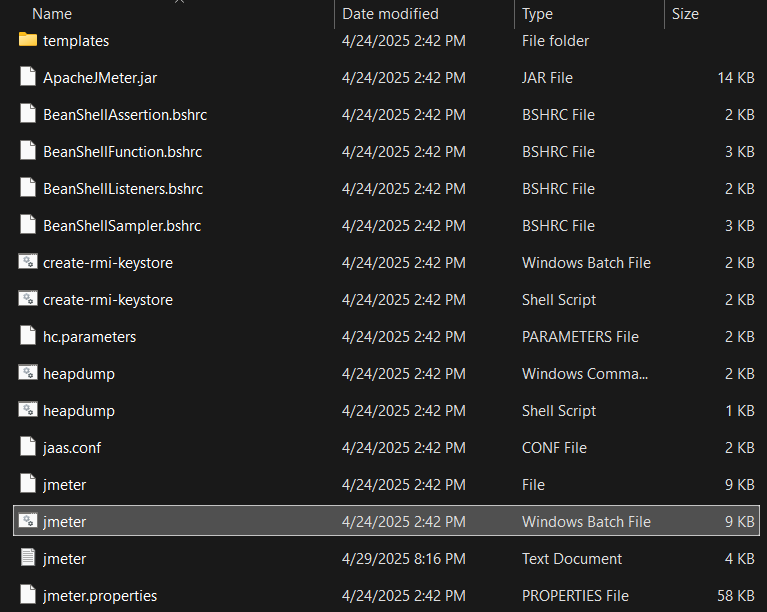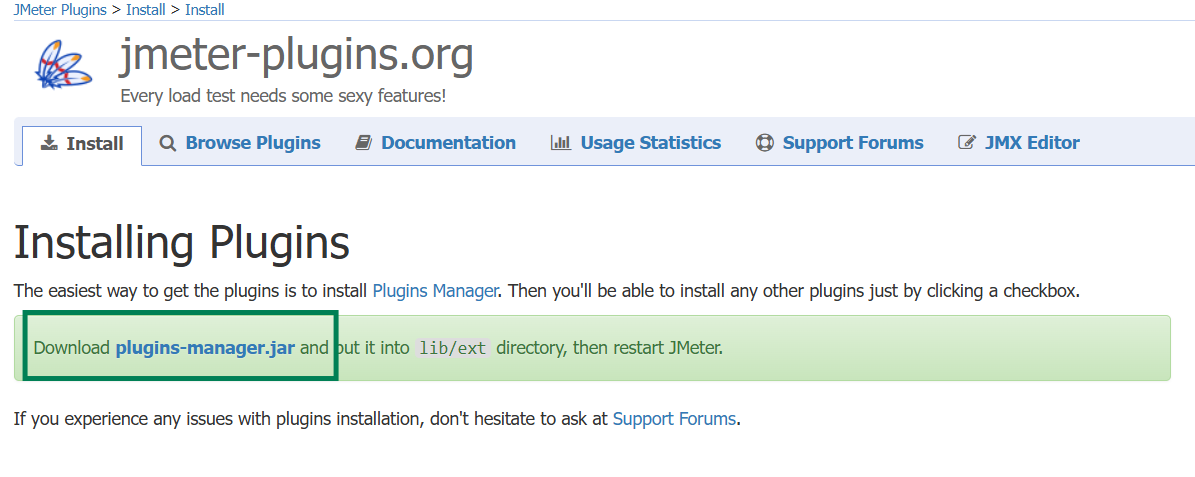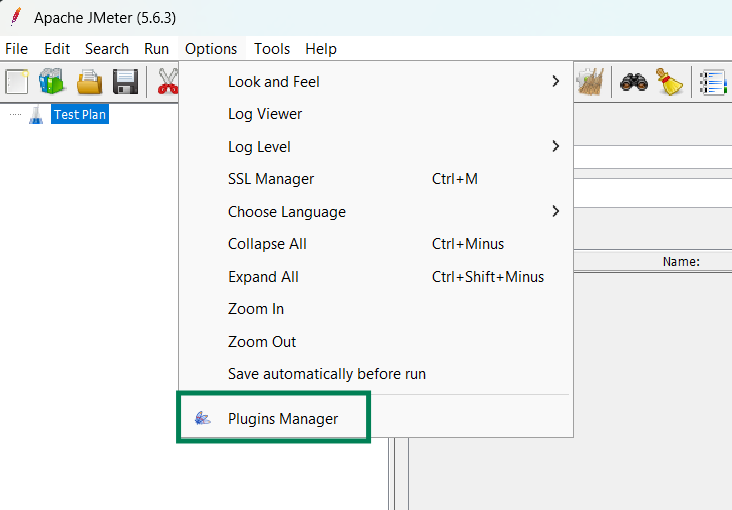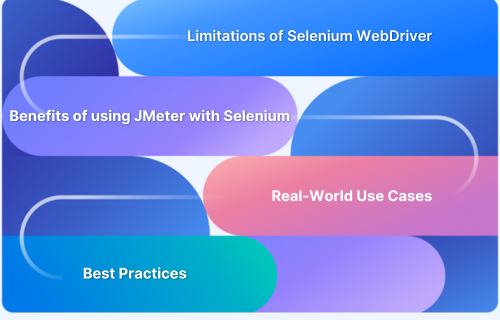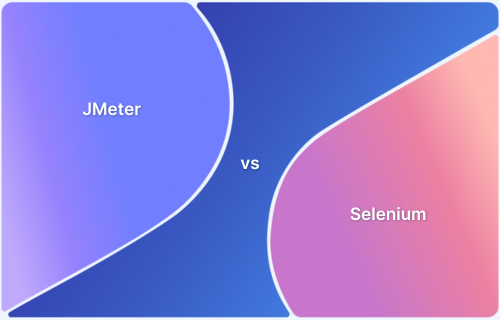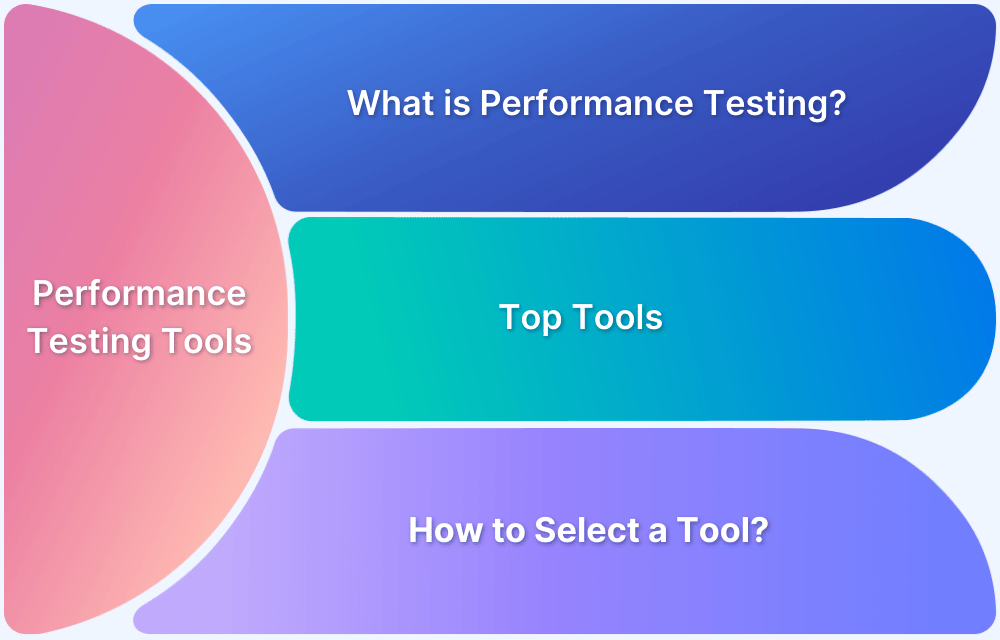Apache JMeter is an open-source performance testing tool that is used for testing web applications and other services. It is most commonly used by QA test engineers and developers.
This tool replicates multiple user interactions with a system to analyze its performance under different circumstances. JMeter allow users to improve and customize their testing experience based on their specific needs through plugins.
Overview
What is JMeter Plugins Manager?
JMeter Plugins Manager is a built-in tool that lets you easily install, update, and manage JMeter plugins directly from within the JMeter interface.
Why Is the JMeter Plugin Manager Needed?
- One-Click Installation
- Access to Popular Plugins
- Version Management
- Time-Saving
- Automatic Dependency Handling
- Up-to-Date Testing Tools
Top 5 JMeter Plugins
- Custom Thread Groups Plugin
- 3 Basic Graphs Plugin
- JSON Plugins
- Dummy Sampler
- PerfMon Metrics Collector
This guide explains what these plugins do and shows how to quickly install and manage them using the JMeter Plugins Manager.
What is JMeter Plugins Manager?
The JMeter Plugin Manager is a jar file that helps manage and install JMeter plugins in a very basic and simple way. The Plugins Manager provides an easy interface for searching, installing, updating, and uninstalling plugins right within JMeter, instead of the need to manually download and place plugin files into the directory.
It also comes with a lot of inbuilt plugins which are classified under functions like reporting, graphs, samplers, and listeners.
This function in the JMeter plugin manager offers more flexibility in performance testing.
Why Is the JMeter Plugin Manager Needed?
The JMeter Plugin Manager simplifies the process of managing and installing plugins, making it an essential tool for enhancing JMeter’s capabilities.
- One-Click Installation: Easily install or update plugins without manual file downloads or directory setup.
- Access to Popular Plugins: Provides a central hub for essential plugins like Custom Thread Groups, JSON plugins, and more.
- Version Management: Keeps track of plugin versions to ensure compatibility with your JMeter installation.
- Time-Saving: Eliminates the need to search and configure plugins manually, speeding up test environment setup.
- Automatic Dependency Handling: Installs required dependencies automatically with selected plugins.
- Up-to-Date Testing Tools: Ensures you’re always using the latest plugin features and bug fixes.
How to Install and Configure JMeter Plugins Manager?
Follow the steps below to install JMeter and JMeter Plugins Manager.
Step 1: Download Apache JMeter: The latest version of JMeter should be downloaded from the official website. Also, Java with version above JDK 8 should be installed, and system environment variables should be set properly.
C:\Users\ >java -version java version "21.0.7" 2025-04-15 LTS Java(TM) SE Runtime Environment (build 21.0.7+8-LTS-245) Java HotSpot(TM) 64-Bit Server VM (build 21.0.7+8-LTS-245, mixed mode, sharing)
Step 2: Download the Plugins Manager JAR – Go to the official JMeter Plugins Manager repository and download the JMeterPlugins-Manager-x.x.jar file.
Step 3: Place the JAR in the JMeter lib/ext Folder – Copy the downloaded JAR file into the following directory: apache-jmeter-x.x/lib/ext/
Step 4: Restart JMeter: Relaunch the application and check if the “Plugins Manager” is appearing under the “Options” dropdown. Click on the “Plugins Manager” option to view the searchable list of available plugins.
Step 5: Install Plugins from the Manager: From the Plugins Manager tab, check the boxes next to the required plugins and click “Apply Changes and Restart JMeter.” The selected plugins will be downloaded and installed. Then the application will restart automatically to activate them.
Step 6: Verify Plugin Installation – Go to the Plugins Manager tab again and verify if the newly installed plugins are available.
Top 5 JMeter Plugins
The following are a few highly regarded plugins in JMeter.
- Custom Thread Groups Plugin: This plugin supports thread group types like Ultimate, Stepping, and Concurrency Thread Groups. It helps to simulate ramp-up patterns and user loads which are very realistic.
- 3 Basic Graphs: The 3 Basic Graphs plugin adds three listeners to JMeter that are Active Threads Over Time, Response Times Over Time, and Transactions per Second. It gives feedback regarding the load test outcomes in a graphic format.
- JSON Plugins: The JSON Plugins provide one sampler and two post-processors: the JSON to XML Converter sampler, the JSON Format Post Processor, and the JSON Path Extractor. It helps to work with data in JSON format.
- Dummy Sampler: It enables the creation of test scripts without impacting actual servers. It can be useful in performance scripting and logic verification before pointing to the production servers.
- PerfMon Metrics Collector: The plugin keeps track of system-level metrics like CPU, memory, and disk usage of the test server.
Read More: Top 20 Performance Testing Tools in 2025
Role of JMeter in Testing
JMeter can perform different kinds of testing beyond basic real-time simulations. The most important ones are:
- Performance Testing: Performance testing will analyse how a website or an application performs under some specific conditions.
- Load Testing: It measures the ability of the system to handle the user traffic. For example, it simulates 100 users navigating to a site and performing an action.
- Stress Testing: The application is pushed beyond its maximum capacity to observe how it functions in such cases. It helps the user in verifying the breakpoints and server limits.
- Spike Testing: This abruptly raises the number of users hitting the application to observe how the system reacts to sudden changes in loading.
- Endurance Testing: This is to verify the stability of the system for a long duration. Running continuous tests for 8-12 hours can expose memory leaks or resource depletion.
- Functional Testing: Even though JMeter is mostly used for non-functional testing, it can also conduct some functional testing for APIs and web services by verifying responses, headers, and values.
Can JMeter be Integrated with Selenium?
It is possible to integrate JMeter with Selenium to enable both functional and performance testing in one script. Selenium will control the UI interactions, while the performance of these interactions would be recorded by JMeter. This type of hybrid approach is used for complicated web applications where actual browser behavior must be taken into account.
JUnit or WebDriver Sampler plugins are used to integrate Jmeter with Selenium. These samplers run Selenium scripts included in the test plan. However, it can take a lot of resources to run browser-based scripts locally. Therefore, it is recommended to restrict the number of browser threads or execute them in distributed environments.
Why Run JMeter Selenium Tests on BrowserStack?
BrowserStack can be used to perform cross-browser performance testing across real devices and browsers for JMeter and Selenium tests.
Websites often encounter performance issues when subjected to heavy traffic, resulting in slow load times, crashes, and poor user experiences.
BrowserStack Load Testing offers teams a robust, cloud-based solution to accurately measure, analyze, and optimize website performance with exceptional precision and flexibility.
Why Choose BrowserStack for Load Testing?
- Simulate Real-World Traffic: Generate thousands of virtual users from diverse locations without the need for complex infrastructure.
- Unified Insights Across the Stack: Access both frontend and backend metrics in a single dashboard, quickly identify bottlenecks, and resolve issues efficiently.
- Seamless CI/CD Integration: Run browser and API load tests directly from your existing test scripts with minimal setup, catching performance regressions before they reach production.
Other the major advantages of running JMeter Selenium tests on BrowserStack include:
- Scalability:Scalability tests can be executed in parallel on multiple devices, which reduces the execution time.
- Real User Conditions: Validate the performance data by testing it in various OS-browser combinations and real user conditions.
- Geolocation Testing Support: Validate how a site behaves in different geolocations, particularly for assisting global audiences.
- Integration Capabilities: BrowserStack Automate allows testing JMeter-WebDriver executions using REST APIs and custom CI/CD integrations.
- Visual Testing: Visual regression tracking will help in analysing how performance issues can affect UI display.
BrowserStack Automate provides a cloud-based infrastructure which eliminates the need for local devices or virtual machines. Testing websites through the Automate feature of BrowserStack will assist in verifying the performance across different traffic loads, analyze cross-browser compatibility and page load speeds in various devices.
Conclusion
The capabilities of JMeter can be enhanced with the help of plugins. These plugins can add flexibility, customization, and are easy to use.
The JMeter Plugins Manager simplifies the process of finding, installing, and managing the added plugins and helps in an efficient test setup.
JMeter will be able to manage different types of performance testing scenarios with the help of plugins and cloud platforms such as BrowserStack. These tools used will ensure thorough evaluation in real time situations and give developers the information needed to optimize performance.


